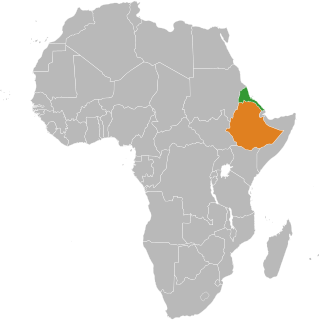Related Research Articles

Isaias Afwerki is an Eritrean politician and partisan who has been the president of Eritrea since shortly after he led the Eritrean People's Liberation Front (EPLF) to victory in 24 May 1991, ending the 30-year-old war for independence from Ethiopia.

Meles Zenawi Asres was an Ethiopian soldier and politician who served as President of Ethiopia from 1991 to 1995 and then Prime Minister of Ethiopia from 1995 until his death in 2012.

The Eritrea national football team represents Eritrea in men's international football and it is controlled by the Eritrean National Football Federation (ENFF). It is nicknamed the Red Sea Boys. It has never qualified for the finals of the FIFA World Cup and the Africa Cup of Nations. Local side Red Sea FC are the main supplier for the national team, The team represents both FIFA and Confederation of African Football (CAF).
Articles related to Ethiopia include:

The 2009 Orange CECAFA Senior Challenge tournament was the 33rd edition of the CECAFA Cup football tournament that involves teams from East and Central Africa. The 2009 edition was hosted in Kenya.

The Constitution of Eritrea is the supreme law of Eritrea. It provides the legal foundation for the existence of the State and source of legal authority. It sets out the rights and duties of its citizens, and defines the structure of government. Despite its ratification by the legislature, the constitution has yet to be implemented as of 2023.
The Eritrean–Ethiopian War ended with the signing of the Algiers Agreement on December 12, 2000. In 2002, in an effort to mitigate the effects of the prolonged stalemate with Ethiopia, the President's Administration created the Wefri Warsay Yika'alo. It is a comprehensive, revolutionary, national economic rehabilitation and development program in the aftermath of the destructive war with Ethiopia. Due to his frustration with the stalemated peace process with Ethiopia, the President of Eritrea Isaias Afwerki wrote a series of Eleven Letters to the UN Security Council and Secretary-General Kofi Annan. Despite the Algiers Agreement, tense relations with Ethiopia have continued and led to regional instability.
Filmon Tseqay (born is an Eritrean footballer. He currently plays for the Eritrea national football team.
Yosief Zeratsion is an Eritrean football goalkeeper. He has played for the Eritrea national football team.
Yonatan Goitum is an Eritrean footballer. He played for the Eritrea national football team.
Mehari Shinash is an Eritrean footballer. He played for the Eritrea national football team.
On January 1, 2010, 3 people were killed in an Eritrea–Ethiopia border skirmish.

The 2011 CECAFA Cup was an international football competition consisting of East and Central African national teams. It was the 35th edition of the annual CECAFA Cup. The tournament was hosted by Tanzania for the second consecutive year and seventh time overall.
As a member of FIFA and CAF, the Somalia national football team has been playing official matches since 1963.

Relations between Eritrea and Ethiopia are historically adversarial. Eritrea gained independence from Ethiopia in 1993 after the Eritrean War of Independence, after which relations were cordial. Since independence Eritrea's relationship with Ethiopia was entirely political, especially in the resuscitation and expansion of IGAD's scope. However, the 1998 Eritrean–Ethiopian War marked a turning point, and their relationship became increasingly hostile.
The 2018 Eritrea–Ethiopia summit was a bilateral summit that took place on 8–9 July 2018 in Asmara, Eritrea, between Eritrean President Isaias Afwerki and Ethiopian Prime Minister Abiy Ahmed and officials from the two countries.
Eritrean Australians are a hyphenated ethnicity of Australians who are of full or partial Eritrean national origin, heritage and/or ancestry. They are immigrants from Eritrea to Australia and their descendants. Eritrea is a multi-ethnic country with the most common ethnic group being the Tigrinya, however Tigrinya speakers are more commonly found in Ethiopia than Eritrea, because of this many Eritreans can be found in Ethiopian communities.
The Tripartite Agreement between Ethiopia, Eritrea and Somalia is a cooperation agreement signed between the three countries' leaders on 5 September 2018.
The Eritrea national football team represents Eritrea in international football under the control of the Eritrean National Football Federation (ENFF). After the Eritrean War of Independence with Ethiopia, Eritrea gained de jure recognition in 1993. The football federation was founded in 1996 and affiliated to FIFA and the Confederation of African Football (CAF) in 1998.

On 24 May 1993, Eritrea gained independence from Ethiopia following a United Nations sponsored referendum, which gained 99.8% Eritrean support for independence. Isaias Afwerki became president and head of Eritrea after winning against the authoritarian Derg government during the Ethiopian Civil War from 1974 to 1991. Isaias would then become a totalitarian leader and was later accused by many watchdogs of repression and purges of journalists, mass surveillance, arbitrary detention, lack of independent judiciary body and freedom of association, press, and speech. In 2015, the United Nations Commission of Inquiry on Eritrea reported that there were "systemic, widespread and gross human rights violations carried out in a context of total lack of rule of law".
References
- ↑ "Eritrea crush Somalia as Rwanda pip Zims". The Standard. Nairobi. 6 December 2009. Retrieved 15 December 2009.
